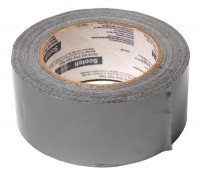As one of the largest tool repair destinations in Central Ohio, Ohio Power Tool sees hundreds of tools in for repair each month. Unfortunately, much of the damage we repaired could have been avoided with just a few basic steps towards good tool maintenance. Sometimes, it seems, people ruin tools through lack of care and maintenance. This list is probably way overdue (and it may put us out of business). However, as a public service, I now present you with seven ways how to ruin your tools. Or, if you like, you can call these the seven deadly sins in the tool repair business. Fortunately, I’ll also show you how to avoid them!
Table of contents
- 1. Never Change Your Brushes
- 2. Fail to Use the Proper Gauge Extension Cord
- 3. Never Lube Your Air Tools or Grease Your Bearings
- 4. Store Your Tools by Tossing Them in the Back of Your Truck
- 5. Overuse Your Accessories Past Their Prime
- 6. Don’t Listen to Your Tools
- 7. MacGyver is One of My Childhood Heroes. Don’t Let Him Fix Your Tools
- Final Thoughts
1. Never Change Your Brushes
“You don’t have to brush your teeth…just the ones you want to keep.” This old saying I heard from my dentist when I was a kid holds true for brushed power tools that you don’t want to ruin. Tools that used brushed motors need fresh brushes if you want them to work properly. This is, by far, the number one maintenance issue with electric tools. Unfortunately, the lack of fresh brushes can cause a number of other issues—like overheating, which leads to much larger and more expensive problems.
Think of it as the oil in your car, but instead of doing oil changes on scheduled maintenance you just run your car until it has noticeable problems. If you’re super-duper lucky, all you would need to do at that point is put in some new oil. On the other hand, you might just blow the motor altogether. It is amazing to me that with power tools more people (and companies) don’t proactively replace brushes on a regular basis. Instead, they just wait until it “needs” them—at which point it might just be too late.
Typically, brushes only cost a few bucks, take seconds to replace, almost always add a noticeable boost in power, and can extend the life of tools exponentially. If that seems like too much work, then there is at least some good news: now you can buy brushless tools and not have to worry about this type of maintenance ever again.
2. Fail to Use the Proper Gauge Extension Cord
If you want to really know how to ruin your tools, underpower them regularly. One issue that can wreak havoc on any electric tool is not getting enough power to the motor. This can happen for a variety of reasons, including using higher gauge (lower amperage) extension cords, using too long of an extension cord, using unstable power on a job site or generator, having nicks or other damage to a tool’s power cord, or any other reason that might lead to not providing the required power to the tool.

If brushes are like oil in your car, then think of electricity like gasoline. If you put bad gas in a car what do you think will happen? It might not be something that destroys the car instantly, and you might be able to get away with it occasionally. Keep putting in bad gas, though, and eventually, you could see any number of very unpleasant things happen. Tools work exactly the same way. Just be aware of the amperage of your tool and the power supply you are working with.
The next time you think of plugging a 15-amp Milwaukee 14″ cut-off saw into a 100 foot long 16 gauge extension cord, just imagine what you might think of a guy filling up his brand new Ferrari at the station with 87 octane.
3. Never Lube Your Air Tools or Grease Your Bearings
More lube is pretty much always the answer—at least when it comes to air tools. If you hope to keep your air tools running for years to come, oil is your best friend. The oil keeps the metal interior parts of the tool from rusting, and it keeps the seals and gaskets functioning properly. It is very common to crack open a broken air tool and see evidence of poor maintenance. This happens for a number of reasons.
Obviously, not remembering to oil the tool frequently when in use is the chief cause, but other considerations can add to the problem. A lot of moisture or debris coming in from the compressor as well as infrequent use of the tool can be very harmful. To remedy moisture or debris in the air lines you might consider a filter system between the air compressor and the line.
Frequent Use Requires Frequent Lubrication
This can greatly improve the life of any tools and equipment connected to the system. Infrequent use might seem somewhat counterintuitive, but these air love to be used regularly—which is why they are such good options for production work. When air tools sit around unused, that means oil is not making its way to all the seals and gaskets. Eventually, this can actually harm the tool.
Certainly, a little extra care for a tool that has been sitting around unused would help, but if you are purchasing a new tool that you know ahead of time will get used less frequently, you should consider a cordless tool option. We’ve seen terrific advancements in battery technology, and with cordless impact drivers like Ingersoll Rand’s 20V IQ series now matching the power of their top-of-the-line pneumatic impacts, your options are getting better and better. Bonus tip: You can ruin your “big boy” tools if you forget to grease bearings and joints.

4. Store Your Tools by Tossing Them in the Back of Your Truck
Proper tool storage can make all the difference! One of the most frequent tool repairs we do is replacing broken parts that come from accidental falls. Typically, this means replacing cracked housings and possibly some internal components (depending upon the severity of the damage).
What is really amazing is how rarely these falls are ever the fault of the user! It seems as though most of the damaged tools we repair simply just don’t want to go on living, and when nobody is watching, they throw themselves off a truck or scaffolding. You can really ruin your tools by not housing them in plastic cases or taking care they don’t get crushed or impacted.
From all accounts given to us in over 30 years in business, this hypothesis must be true because we rarely ever hear of people actually dropping their tools. Properly storing tools can be a big help in protecting them from drops or from getting crushed by something else in the back of a truck. A good storage solution will also keep excess dirt and debris from getting into the tool while not in use. Over time, that can certainly add up to problems. If compressed air is handy, it also never hurts to blow the tools off before storing them.
5. Overuse Your Accessories Past Their Prime
Behind every great tool should be a great accessory. In the past 5-10 years, there has been an incredible amount of R&D invested in even the most “basic” accessories that really do improve overall tool functionality. Overusing dull blades is a sure-fire way to overtax a brushed or brushless motor and ruin your power tools.
Take the spade bit, for example. It existed for decades without any significant change to its design. Now, with innovations like the self-feeding tips on Bosch DareDevil spade bits, you can see how spending a few extra pennies on an accessory can not only improve the user experience—it can make your tool work smarter.
When you use a smarter and more efficient accessory, it means that instead of having to throw your full body weight on top of a drill to literally push your way through a 4×4 (a very common technique), you can let the tool do most of the work for you. The motor on your tool will last longer, and your back and arms will thank you later.
6. Don’t Listen to Your Tools
One seemingly obvious way you can ruin your tools is simply to not listen to what they’re are saying! We’ve heard tons of tool-use stories where the product gave fair warning there might be some problem. For example, if the tool is too hot to touch, don’t just put a rag over it and keep going—this just makes it overheat faster. Remember, where there is smoke there is fire (and fire inside your power tool is bad).
Duct tape is not a suitable replacement for your finger when it comes to pushing in safety buttons or holding down triggers.
Speaking of duct tape—placing it over the exhaust ports is also a great way to ruin your power tools. This is not a suitable way to make your tool dust and/or waterproof! If the tool keeps shutting off during heavy use, it probably has some electronics in place to keep it from overheating—and, no, there is no way for a warranty repair shop to override that feature because you find it “annoying”.
Tools are designed by pretty smart folks (as you may have read elsewhere on this site). Tools themselves often give you warning signs that trouble is coming. Listen to your tools, and give them a short break from time to time (or whenever they ask for it).
7. MacGyver is One of My Childhood Heroes. Don’t Let Him Fix Your Tools
Guys and gals that use power tools every day are an increasingly resourceful bunch. When something breaks, the natural inclination is, of course, to fix it. If you are going to tackle maintenance and tool repair projects on your own, please just make sure you take the time to first get your hands on the manufacturer’s breakdown manual (Many brands are available at Ohio Power Tool). Then, feel free to order the correct parts for repairs.
All too often we see improper repairs that lead to bigger problems that end up damaging or ruining a tool beyond repair. More importantly, there are obvious safety concerns to consider that can lead to serious injuries or worse.
Final Thoughts
Most of these items are common sense for tool maintenance, but it is amazing how often the basics are overlooked—leading tools to end up needing early repair. Be smart, and treat your tools with respect (even if your boss paid for them), and they will last you much longer.








